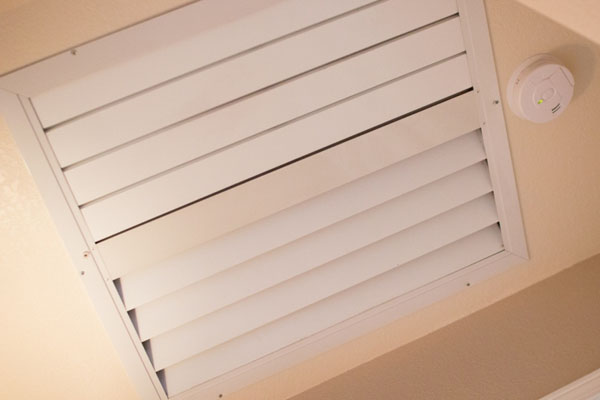
08 Dec Cooling Down with a Whole-House Fan
Can a whole-house fan be beneficial in cooler weather? Jared looks at the pros and cons of breezy “air conditioning”…In the House.
Jared: Sam you’re in the house, how can I help you?
Sam: Hi, Jared. We’re doing new construction and I want to put in whole house ventilation. What are the downsides? I realize the down draft problem potential with combustible energy sources, but I’m aware of that and we’re probably going to go all electric anyway. See, I’m a fresh air fiend, and there’s probably at least 2 or 3 months in Florida at night you can just open the windows and have the breeze come in; you’re comfortable. What do you think are the upsides, downsides?
Jared: Sam, great question. I’ll explain to everybody else what we’re talking about. This was extremely common here in Florida prior to air conditioning. In fact, if you look at a lot of the houses built in the 50’s they have what’s called a whole house fan, where centralized somewhere in the home there’s a large fan – usually in a hallway in the center of the home. Typically the fan was on the ceiling and operated by a wall switch. The principle to it is getting good air flow into the home. With a nice breezy day you can just open all the windows and have air flow, but on a non-breezy day there’s not a whole lot of movement; this fan turns on and pulls the air from the outside of the home into the windows and then exhausts them into the attic system. It’s called a whole house fan.
Now, according to America’s Energy Department, homeowners should use caution when operating these large exhaust fans. They advise opening windows throughout the house to prevent a powerful and concentrated suction in one location. If enough ventilation isn’t provided, the fans can cause a backdraft in your furnace, water heater or gas-fired dryer, pulling combustion products such as carbon monoxide into your living space. In your case, if you’re going all electric, then that wouldn’t be a problem.

There are some concerns when it comes to the ventilation system of the attic. There has to be some way to close that damper completely off of the fan, because with a ventilation system for the attic, the way that it works is that you want the hot air to rise so that the cool air can actually come in. The hot air will only escape at the same rate the cool air will come in, and we don’t want to air condition the attic, we actually want the outside air to come in through the soffits and then exhaust through the roof vent. Those whole house fans, they have a damper on them but it’s not necessarily air tight. What we find is that on the times when you’re not using it, you are air conditioning your attic because some of that air conditioning on the inside of the house is actually escaping.
Now I have seen in the past where the dampers themselves actually have insulation on them. I’ve seen other people actually create basically this cover that goes over the top with some sort of insulation on it; that method is pretty good. I’m not concerned about when it’s being used – yes it throws off the air flow in the attic, but I’m not too concerned about that because you’re only using it in times where it’s cool outside. So therefor, the air flow doesn’t matter as much. It’s the times when it’s really hot during the summer when you’re not using it, and the times when it’s really cold during the winter that you’re not using it that may be an issue. But as long as you have some sort of insulated system for when it’s not being used, then I’m not opposed to it.
Sam: Yes, so as far as introducing outside humid air, it does introduce higher risk of mildew or those kind of problems during hot and rainy times of the year, right?
Jared: If it’s so hot and humid then you’re not going to be using it anyways, you know what I mean?
Sam: Probably not.
Jared: You’re only going to use it on the days where it makes sense, so no from that perspective I’m not concerned about it, it’s just when you’re not using it that I’m concerned about it.
Sam: Sure. Now, there are products out there that have dampers and insulated dampers, some of them R-35, so I’ve got that covered. I appreciate that.
Jared: Interesting concepts… interesting ideas. Thanks for your call man, we appreciate it.
For more information on roof cleaning, visit the ARMA website or watch the ARMA Guide to Algae Discoloration video. Listen Saturday mornings to “In the House”. Get more Home Tips and show info at the In the House website. For a free inspection and estimate on your next Home Improvement Project, visit Universal Roof & Contracting or call now. Orlando: 407-295-7403 Jacksonville: 904-647-3907.



